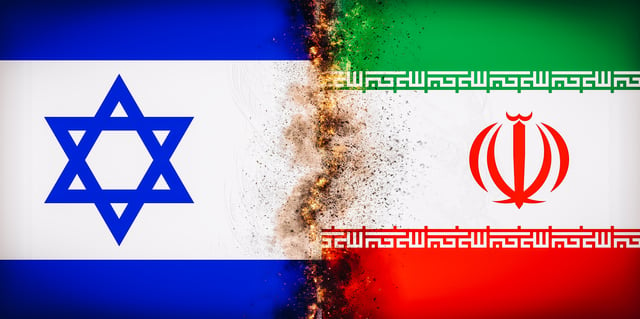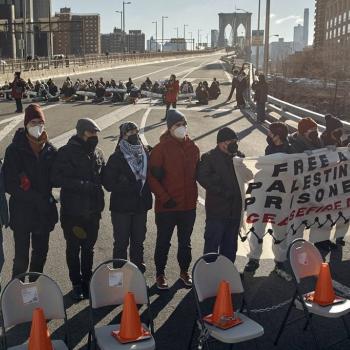
Nuclear Debate: Was Israel’s Attack on Iran Justified?
This past Thursday, June 12, Israel militarily attacked Iran because Iran has purportedly been enriching uranium to achieve “weapons-grade” atomic material. Was this attack morally justified? Let’s take a look.
Israel’s Nuclear History
Israel is believed to have become a nuclear-armed state in the mid to late 1960s; consequently, they have never confirmed or denied possessing nuclear weapons. They have maintained a

policy of “nuclear ambiguity” and have not signed the Nuclear Non-Proliferation Treaty (NPT). This treaty serves as the foundation for the International Atomic Energy Agency (IAEA) safeguards in participating countries. Israel has a limited agreement, known as the “item-specific safeguards agreement,” with the IAEA, which generally applies to specific facilities in Israel, reportedly not all. Israel maintains a policy of “nuclear ambiguity” as a deterrent against threats and to prevent an arms race in the Middle East. Based on its history, this policy is indeed critical for Israel’s protection.
Iran’s Nuclear History
Iran was an early adopter of the U.S.-led “Atoms for Peace” initiative in the late 1950s, explicitly designed to share nuclear technology for peaceful purposes. The 1979 Islamic Revolution significantly stalled the program, as Iran cut ties with Western countries. Iran secretly resumed its nuclear program in the late 1980s with assistance from Pakistan and China. The Iranian atomic ambitions became concerning in the early 2000s. Iran never declared Natanz and Arak as nuclear sites, and the IAEA determined that enrichment levels were as high as 79% at these sites. Uranium is typically enriched between 3% and 5% for peaceful purposes. This discovery led to a series of international diplomatic efforts and restrictions against Iran.
In 2015, Iran reached an agreement on the “Joint Comprehensive Plan of Action;” as a result, the agreement limited Iran’s enrichment process to levels required for peaceful purposes. In exchange, sanctions on Iran’s government and its ability to sell oil were loosened. It is believed that the loosening of these sanctions provided Iran the money necessary to sponsor terror attacks across the globe. Many of these attacks were against the U.S. and Israel. President Trump withdrew from the agreement in 2017.
Why Attack Now?
Israel believes that Iran has enriched enough uranium to build multiple nuclear weapons. Indeed, the IAEA determined that Iran enriched ~400kg of atomic material to 60% purity (weapons-grade is 90%). The increase from 60% to 90% could take days or weeks, putting Iran very close to a nuclear weapon. Iranian leaders have made statements that they intend to “wipe Israel off the map.” Specifically, Israel believes that Iran possessing a nuclear weapon is an “existential threat” to their existence. Since Iran is the primary sponsor of Islamic terror, and their goal is to “wipe Israel off the map,” this situation is without a doubt an existential threat to Israel.
U.S. attempts to re-engage in discussions with Iran to limit its nuclear capabilities have failed. The Iranians have yet to agree to the critical requirements set forth by the U.S., which complicates diplomatic efforts. This impasse directly threatens regional stability and security.
Is This Attack Morally Justified?

The Catholic Church teaches that the use of force, including lethal force, is permissible in self-defense. The Catechism of the Catholic Church has a “Just War” doctrine (2309), which states:
CCC 2309
The strict conditions for legitimate defense by military force require rigorous consideration. The gravity of such a decision makes it subject to rigorous conditions of moral legitimacy, specifically:
- The damage inflicted by the aggressor on the nation or community of nations must be lasting, grave, and certain;
- All other means of putting an end to it must are impractical or ineffective.
- There must be serious prospects of success.
- The use of arms must not produce evils and disorders graver than the evil to be eliminated. The power of modern means of destruction weighs very heavily in evaluating this condition.
These are the traditional elements outlined in what is known as the “Just War” doctrine.
Therefore, under the criteria of the “Just War” doctrine, this conflict qualifies as a just war. Iran has openly expressed its intent to eliminate Israel. Iran is actively pursuing this objective through a series of sustained proxy attacks. Should the regime succeed in acquiring nuclear weapons, the situation would likely intensify dramatically. Moreover, Israel would likely become the most probable target.
God gives us life, and only God should take it away. In situations where one side is intent on destroying the other, as Iran is intent on doing with Israel, the use of lethal force is morally just. Unfortunately, it has gotten to this point. Let us all pray for a quick end to hostilities and an opportunity to build a lasting peace in the region.
Please let me know your thoughts on this article in the “Comments” section.
If you like this article, you might enjoy:
Our World Needs Peace – Be A Peacemaker
Christian Nationalism: Can Faith And Patriotism Coexist?
Gratitude Can Transform Your Daily Life
Peace













